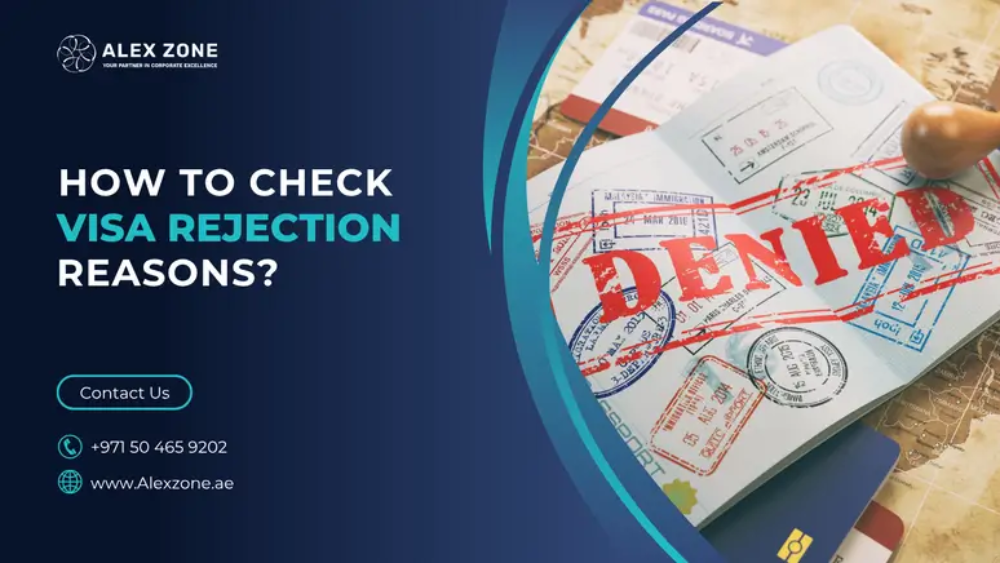Understanding how to check UAE visa rejection reasons can save time, money, and unnecessary stress. Whether you’re applying for work, tourism, or residency, knowing the exact cause behind your visa refusal helps you correct issues and reapply successfully.
This guide will walk you through every detail of identifying and addressing your UAE visa rejection.
Understanding UAE Visa Rejection
Facing a UAE visa rejection can be stressful, especially when you’re unsure why it happened, so knowing how to check UAE visa rejection reasons can save you valuable time, money, and unnecessary stress.
Let’s learn the reasons behind the rejections
UAE Visa Rejection Reasons
Knowing how to check UAE visa rejection reasons becomes easier when you’re aware of the most common causes. A rejected visa doesn’t always point to serious violations; it could be due to avoidable mistakes or overlooked details.
- Incorrect personal details, such as spelling errors or mismatched passport numbers.
- Submitting documents that are expired, blurry, or missing mandatory information.
- A previous visa refusal from the UAE or another Gulf country.
- Multiple applications submitted under the same name or passport.
- Employment-related restrictions or labor bans imposed by previous sponsors.
- Previous overstays or security issues may trigger a visa refusal.
- Issues with the applicant’s photograph specifications or document translations.
By understanding these UAE visa rejection reasons, applicants can improve their chances of approval on their next attempt and avoid repeating the same mistakes.
How to Check UAE Visa Rejection Reasons
Although UAE authorities may not always provide clear reasons for a refusal, you can still take steps to uncover the cause:
- Visit the GDRFA (General Directorate of Residency and Foreigners Affairs) website or use their app
- Use your visa application reference number to check status
- Contact the typing centre or travel agency that submitted your application.
- If sponsored by a company, ask the PRO (Public Relations Officer) to follow up.
- In case of UAE visa rejection, request an official reason in writing if possible.
- You may also receive an email or SMS update from the immigration department.
Knowing how to check UAE visa rejection reasons and the cause behind a visa refusal helps you take corrective steps and increases your success rate in the next application.
Learn Also: How to Check Dubai Visa is Original or Fake

UAE Visa Refusal Due to Healthcare Reasons
Here are the most common healthcare-related causes for UAE visa refusal:
- Testing positive for communicable diseases like tuberculosis or hepatitis B may result in immediate rejection.
- Some visa categories require testing for HIV or syphilis, and failed results are one of a frequent visa rejection reasons.
- X-ray scans that show lung scars or past infections can lead to rejections.
- Foreign medical reports may be rejected if not recognized by the UAE authorities.
- Only results from MOH-approved medical centres are accepted.
- A UAE visa rejection can occur if there is suspicion of falsified health reports.
To avoid medical-related visa issues, always undergo screening at authorized UAE centres and verify that your medical history complies with UAE regulations.
What to Do After Your Visa is Rejected
Facing a visa denial can be frustrating, but knowing how to check UAE visa rejection reasons helps you take the next steps wisely.
Instead of panicking, follow a structured plan to address the issue:
- Review the rejection notice for any listed UAE visa rejection reasons.
- Contact your sponsor, travel agency, or PRO to obtain clarification.
- Visit the GDRFA office or use online tracking tools to confirm the rejection.
- Fix errors in your application, such as document issues or typos.
- If related to visa refusal due to health or security, check with the appropriate authority.
- Reapply after correcting the problem or appeal if you believe it was unfair.
- Seek help from a legal consultant if your case involves complex legal matters.
Acting quickly and understanding the rejection improves your chances of approval on your next submission.
7 Tips to Avoid UAE Visa Rejection in the Future
To prevent future rejections, it’s important to understand how to check UAE visa rejection reasons and apply best practices early on.
- Double-check all submitted documents for accuracy and completeness.
- Ensure your passport has at least six months’ validity.
- Avoid applying with a previous history of uae visa rejection without addressing the cause.
- Always provide genuine medical records and certificates.
- If applying through an agent or company, choose one with proven experience.
- Review visa refusal trends for your nationality and visa type.
- Keep a copy of all communications and receipts related to your application.
Following these tips minimizes the risk of rejection and improves your confidence in obtaining a UAE visa smoothly.

Why Choose Alexzone for Visa Assistance and Appeals
When facing visa complications, understanding how to check UAE visa rejection reasons is only the first step; choosing the right support makes all the difference.
At Alexzone, we specialize in resolving even the most complex visa issues, including challenges related to UAE residence visa applications.
- We help clients interpret UAE visa rejection reasons accurately and efficiently.
- Our team offers personalized advice on document corrections and reapplications.
- We guide you through appeal processes and liaise with immigration authorities.
- Full support for visa refusal cases, including medical or legal complications.
- We offer fast, transparent, and compliant service tailored to your visa category.
- Our success stories include work, residency, and family visa approvals after rejection.
- We save you time, effort, and the stress of navigating procedures alone.
Alexzone is your reliable partner when you need smart, practical solutions to secure your UAE visa.
Conclusion
Understanding how to check UAE visa rejection reasons empowers applicants to make informed decisions and avoid repeating past mistakes. Whether you’re applying for the first time or appealing a previous UAE visa rejection, knowing the process is essential.
Being proactive, submitting correct documents, and working with trusted experts like Alexzone increases your chances of success.
Don’t let a visa refusal stop your plans, get the right support and move forward with confidence.
Frequently Asked Questions
1. How can I check my UAE visa rejection reason?
You can check it through the GDRFA portal or consult Alexzone for a detailed review of how to check UAE visa rejection reasons.
2. Can I reapply after a visa refusal?
Yes, but it’s important to fix the issues behind the visa refusal before reapplying.
3. Will a previous UAE visa rejection affect my future applications?
It might, especially if uae visa rejection reasons are not addressed properly.
For a free consultation, contact us now and let us help you choose the best for your project.



Leave Your Comment